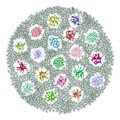For a long time I've had a gut feeling that the emphasis on story telling, aka narrative, is somewhat overblown in a number of disciplines. It seems obvious that any complex adaptive system is going to have to deal with "story" in the following sense. Everything exists in time and space. Spacial objects change over a period of time. And there's your story.
As trivial as that might sound, I think there is a kernel of critique there. Because in many contemporary schools of thought a quick step is made from the unfolding of physical events in time to the (attempted) capture and representation of events in and as language. And we are off to the races with all manner of linguistic concerns, often to the point where the world is forgotten and language is posed as a first principle.
Language is of course really important. And humans are the best language processing systems we know of. But events precede language, not the other way around. (Precede in most every way, certainly logically, ontologically, and temporally). Not that you would know that by listening to many of those in the humanities and even some social scientists.
Anyway, it seems to me that if you want to build a generative story telling system you shouldn't start with text processing or really any kind of linguistic concerns at all. You need to begin by simulating the world. Or a piece of it. And only after you can create (virtual) physical events that take place over time do you need to think about how to present them. And you can do that in language, as video, in Second Life, or any number of ways.
Generative story telling has to begin with a world simulation not because language is difficult, but rather because of language's lesser ontological status.
Sunday, September 28, 2008
Subscribe to:
Post Comments (Atom)

No comments:
Post a Comment